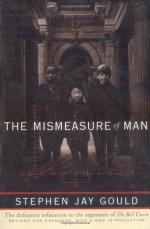
|
| Name: _________________________ | Period: ___________________ |
This test consists of 15 multiple choice questions and 5 short answer questions.
Multiple Choice Questions
1. What was Francis Galton's book published in 1869?
(a) Hereditary and Race
(b) Hereditary Genus
(c) Hereditary Explorations
(d) Hereditary Genius
2. Each person is assigned a single ________ that determines his ranking on the scale.
(a) measurement
(b) chance
(c) test
(d) number
3. Science means looking for the ________ based on facts.
(a) truth
(b) reality
(c) theory
(d) answer
4. Who feels that blacks are inferior and therefore deserve the status of a slave?
(a) Racial ranking experts
(b) Hard liners
(c) Red liners
(d) Soft liners
5. What is the one category to which Socrates does NOT say people belong?
(a) Auxiliaries
(b) Rules
(c) Craftsman
(d) Peasants
6. Gould wants to know if science added the ___________ data, or......
(a) reliable
(b) total
(c) partial
(d) legitimate
7. Experts claimed it was no good to __________ blacks.
(a) study
(b) listen to
(c) educate
(d) understand
8. Who was a 19th century anatomist who believed in the theory of polygenism?
(a) Broca
(b) Serres
(c) Gould
(d) Blumenbach
9. Which view was based on the story of Adam and Eve?
(a) Polygenism
(b) Monogenism
(c) Racial ranking
(d) Recapitulation
10. When did craniometry first appear in the study of intelligence?
(a) Last 18th century
(b) Late 19th century
(c) Early 19th century
(d) Early 18th century
11. David Hume was a believer in the superiority of the _______ and polygeny.
(a) white child
(b) black race
(c) white female
(d) white race
12. The author of "An American Dilemma" says that Americans and others would only consider the __________ factors when they were forced to.
(a) educational
(b) spiritual
(c) biological
(d) environmental
13. Did a desire for ______ lead to the questions and data to support a predetermined conclusion?
(a) races
(b) ranking
(c) answers
(d) slaves
14. The answer to #48 also tried to show the entities with a higher ranking had to repeat the _________ of those with lower ranking.
(a) education
(b) illnesses
(c) work
(d) growth stages
15. The craniometry argument is the first __________ argument that has been offered.
(a) reliable
(b) scientific
(c) plausible
(d) logical
Short Answer Questions
1. If inferiority is cultural, then it can be changed by __________ factors
2. Who was the data analyst for the answer to #55?
3. What does Gould want to find in science that will support the idea that biological determinism is a result of social prejudice?
4. Flaws in the experimental design, according to Gould, do not lead to _________ in the numbers.
5. What was the most famous work of the man in #59?
|
This section contains 373 words (approx. 2 pages at 300 words per page) |

|




